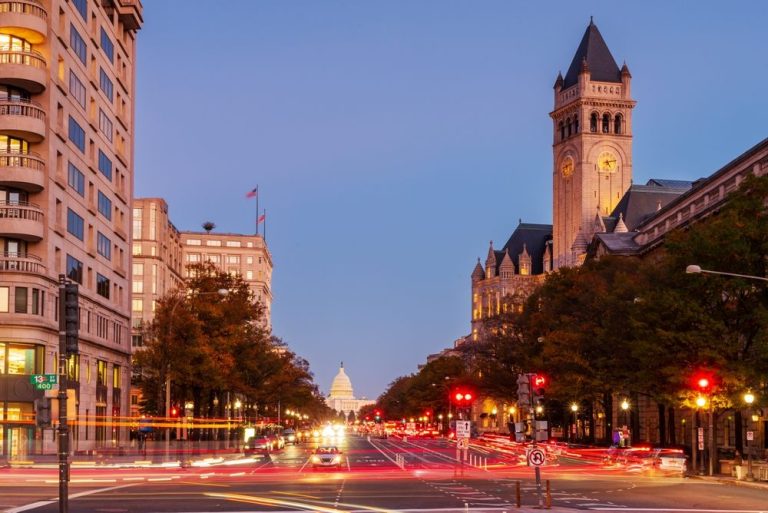This month in D.C., SEC finally approves the climate change reporting requirements rule, proposed “shrinkflation” legislation, the National Institute of Standards and Technology (NIST) debuts a revamp of its cybersecurity framework, and more. Learn how this month’s activity in D.C. impacts your business.
What’s Next In Washington
- Government Funding Inches Forward – Having avoided another deadline for a partial government shutdown, Congressional leaders announced a package of a half dozen annual appropriations bills, setting the stage for Congress to avoid a partial government shutdown on March 8th. Top House and Senate Democrats and Republicans reached agreement to fund the Departments of Agriculture, Commerce, Energy, Housing and Urban Development, Interior, Justice, Transportation and Veterans Affairs until the end of the current fiscal year (September 30th). Lawmakers have yet to announce agreement on the remaining six appropriations bills, which include the massive and controversial budgets of the Departments of Defense and Health and Human Services. Funding for these six agencies is set to run out on March 22nd.
SEC
- Climate Change Reporting Rule Approved – After two years of debate and with a party-line 3-2 vote, the Securities and Exchange Commission (SEC), approved its climate change reporting requirements rule. While the approved rule does not include the onerous Scope 3 reporting requirements that would have mandated companies report on a broad range of indirect emissions, companies will be required to report Scope 1 emissions, which come directly from their operations, and Scope 2 emissions from energy purchases, but only if they are considered of material interest to investors. The new rule also will require companies to report climate-related risks – such as floods and wildfires – that could have a material impact on their bottom line. Steps taken to mitigate or adapt to climate risks will need to be disclosed, as well as losses incurred as a result of severe weather. However, the requirement that companies state the climate expertise of members on their board of directors was not included in the final rule. The SEC estimates that roughly 2,800 U.S. companies will have to make the disclosures, and about 540 foreign companies with business in the U.S. will have to report climate information. The largest companies will have to start reporting emissions for fiscal year 2026, while smaller companies will have to disclose some information for fiscal year 2027, but not emissions:
- The SEC now faces challenges on multiple fronts:
- West Virginia Attorney General Patrick Morrisey announced that 10 states were filing a challenge to the rule with the U.S. Court of Appeals for the 11th Circuit.
- The U.S Chamber of Commerce is considering litigating as well.
- Republicans in Congress are vowing to try to overturn the rule.
- Sen. Elizabeth Warren (D-Mass.) said she was disappointed by the SEC’s decision to “significantly weaken the rule in response to an onslaught of corporate lobbying.”
- An array of environmental organizations similarly expressed their disappointment and left the door open to filing their own litigation.
- Human Capital Rule Sought – A coalition of 17 groups including investor advocates, labor groups and the Illinois state treasurer, banded together to ask that the SEC to propose a rule mandating that public companies disclose human capital management metrics. The groups behind this letter to Chair Gary Gensler include Americans for Financial Reform Education Fund (AFREF), AFL-CIO, Better Markets, and the United Food and Commercial Workers International Union.
- Re-Proposal of Buyback Rule Urged – The Americans for Financial Reform Education Fund also led a letter with 13 additional signatories urging the SEC to repropose the stock buyback disclosure rule to provide investors with information about what they termed is a “widespread yet opaque practice.” The initial rule was struck down by the Fifth Circuit Court of Appeals following a challenge by the U.S. Chamber of Commerce.
- Federal Appeals Court to Rule on NASDAQ Diversity Requirement – A federal appeals court agreed to rehear a challenge to NASDAQ’s board diversity rule related to the disclosure of women and minority membership on boards of companies listed on the stock exchange. In its ruling, the Fifth Circuit vacated an October 2023 decision upholding the rule which requires companies to disclose details about the diversity of their boards of directors and to either have a minimum number of women and minorities on their boards or explain why they do not. The 5th Circuit’s order said it will reconsider the legal challenge to the SEC’s approval of NASDAQ’s rule.
- New Reporting Rules for Private Funds & Investment Advisers – The SEC and the Commodities Futures Trading Commission (CFTC) jointly approved new reporting requirements and agreed to share the confidential information collected on forms for private funds and investment advisers. The agencies said this would boost the government’s ability to spot the build-up of risk in the $20 trillion private investment sector. These changes will affect how advisers to large hedge funds report exposures to investments, counterparties, and currencies as well as exposures to countries and industries, the performance of investments by strategy, and the liquidity of portfolios, among other things.
FTC
- Sen. Warren & Others Propose Series of Consumer Protection Laws – Sen. Elizabeth Warren (D-Mass.), along with other senators, has proposed several piece of legislation to crack down on “shrinkflation” as well as price gouging – with new funding for the Federal Trade Commission (FTC) to enforce them. The Shrinkflation Prevention Act would empower the FTC and state attorneys general to crack down on companies that reduce product size without a price cut. The reintroduced Price Gouging Prevention Act of 2024 would empower the FTC (which would also get $1 billion in additional funding, which significantly exceeds the agency’s current total budget), and state attorneys general, to stop companies from charging “grossly excessive” prices, regardless of where alleged price gouging took place in a supply chain. It would also require public companies to disclose more about their costs and pricing strategies.
Labor
- NLRB
- Political Sloganeering & Dress Code – The National Labor Relations Board (NLRB) issued a decision that found that an employer (Home Depot) violated the National Labor Relations Act when it discharged an employee for refusing to remove the hand-drawn letters “BLM” – the acronym for “Black Lives Matter” – from their work apron. Several other employees at the same store also displayed “BLM” markings on their work aprons at about the same time. In a 3-1 decision, the NLRB ordered Home Depot to rehire the individual with back pay.
- Constitutionality of Board Questioned – Amazon has now joined SpaceX and Trader Joe’s in suing the NLRB, arguing that the Board’s structure violates the separation of powers, and is therefore unconstitutional. The Board includes Administrative Law Judges (ALJs) who work for the agency and do not hear cases in front of a jury.
Cyber Security
- Data Security – President Biden issued an Executive Order to protect Americans’ genomic, biometric, health, geolocation, and financial data through restrictions on large-scale data transfers and commercial transactions to countries of concern. The EO also calls on Congress to pass comprehensive privacy legislation.
- New Cybersecurity Roadmap – In an important development for every company, the National Institute of Standards and Technology (NIST) debuted a highly anticipated revamp of its cybersecurity framework. The agency framework has long provided a baseline for federal cybersecurity regulations and informed how private companies build and regulate their own cybersecurity practices. NIST’s Cybersecurity Framework 2.0 details how companies can best structure their organizations to address various security issues, such as supply chain security and identity management. The framework is organized around six functions: governing internal cyber programs, identifying potential weaknesses and threats, protecting against those threats, detecting abnormal activity on a network, responding to a cyberattack, and recovering from one. NIST published a reference tool, user guides, and examples of ways to implement the framework to help organizations digest the material.
Additional Key Developments
- China – Key developments include:
- Chairman Mike Gallagher (R-Wisc.) and Ranking Member Raja Krishnamoorthi (D-Ill.) of The House Select Committee on the Strategic Competition Between the United States and the Chinese Communist Party, led a bi-partisan congressional delegation to Taiwan, meeting with Taiwan President Tsai Ing-wen, President-Elect Lai Ching-te, Vice President-Elect Hsiao Bi-khim, Legislative Speaker Han Kuo-yu, and Deputy Speaker Johnny Chiang.
- By a vote of 414-6, the House of Representatives passed the Uyghur Policy Act of 2023, which was sponsored by Rep. Young Kim (R-Calif.) and Rep. Ami Bera (D-Calif.). The bi-partisan, bicameral bill would create a comprehensive, multilateral strategy to raise international awareness of the persecution of Uyghurs, direct the State Department to effectively respond to human rights challenges in the Xinjiang Uyghur Autonomous Region, and push back on efforts to silence Uyghur voices. The bill now heads to the Senate, where it has been championed by Sen. Marco Rubio (R-Fla.) and co-sponsored by Sen. Catherine Cortez Masto (D-Nev.) and Sen. Roger Marshall (R-Kan.).
- A number of influential Democrat senators – Banking Committee Chairman Sherrod Brown (Ohio), Armed Services Committee Chairman Jack Reed (R.I.), Intelligence Committee Chairman Mark Warner (Va.), and former Foreign Relations Committee Chairman Bob Menendez (N.J.) – wrote to President Biden requesting a significant increase to the Commerce Department’s Bureau of Industry and Security (BIS) budget in order to enhance export controls.
- Commerce Secretary Gina Raimondo said she is open to banning any Chinese company that accesses data from Americans from doing business in the U.S. , but she would need a new law passed by Congress in order to do that.
- Sherrod Brown (D-Ohio) and Rick Scott (R-Fla.) called on President Biden to end the so-called de minimis loophole which allows packages with contents under $800 in value to enter the U.S. exempt from U.S. duties, taxes and fees, and with little or no inspections. Many of those products come from China, including those alleged to have been made with Uyghur forced labor. Rep. Mike Gallagher (R-Wisc.) added, “Exploitation of the de minimis loophole is accelerating the export of American jobs and giving Chinese companies using Uyghur forced labor a complete pass.”



